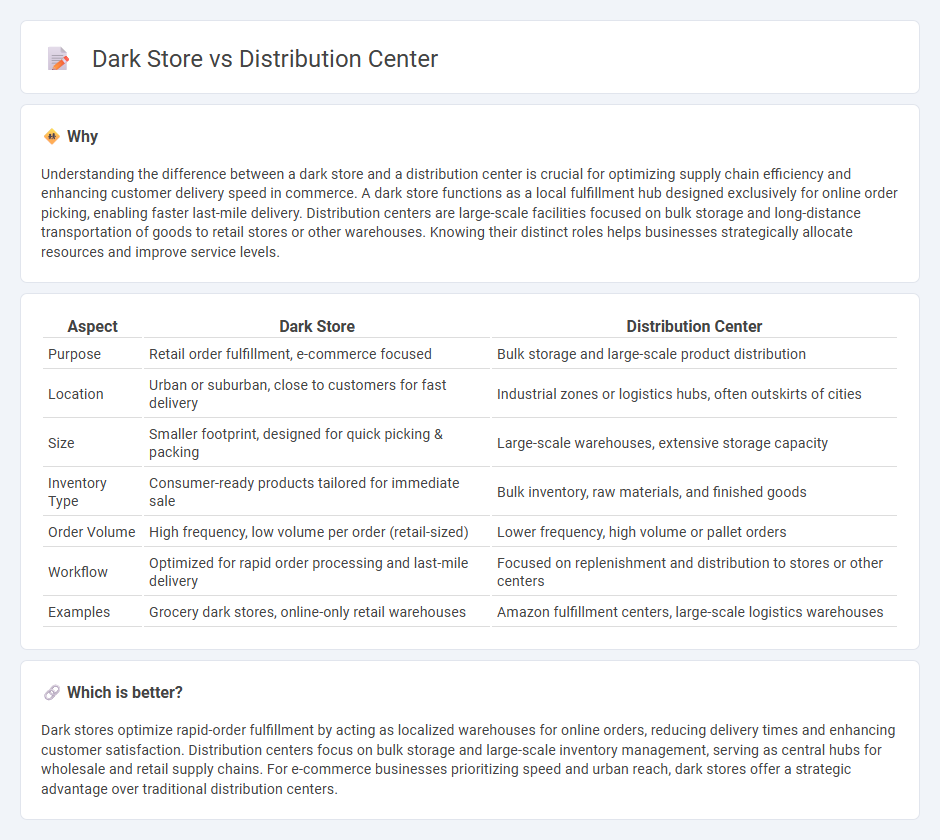
Dark stores are fulfillment centers designed exclusively for online order processing, enabling faster delivery and optimized inventory management for e-commerce businesses. Distribution centers serve as large-scale hubs for storing products and managing bulk shipments to retail locations or customers, emphasizing wide-scale logistics efficiency. Explore the key differences and benefits of dark stores and distribution centers to optimize your commerce strategy.
Why it is important
Understanding the difference between a dark store and a distribution center is crucial for optimizing supply chain efficiency and enhancing customer delivery speed in commerce. A dark store functions as a local fulfillment hub designed exclusively for online order picking, enabling faster last-mile delivery. Distribution centers are large-scale facilities focused on bulk storage and long-distance transportation of goods to retail stores or other warehouses. Knowing their distinct roles helps businesses strategically allocate resources and improve service levels.
Comparison Table
| Aspect | Dark Store | Distribution Center |
|---|---|---|
| Purpose | Retail order fulfillment, e-commerce focused | Bulk storage and large-scale product distribution |
| Location | Urban or suburban, close to customers for fast delivery | Industrial zones or logistics hubs, often outskirts of cities |
| Size | Smaller footprint, designed for quick picking & packing | Large-scale warehouses, extensive storage capacity |
| Inventory Type | Consumer-ready products tailored for immediate sale | Bulk inventory, raw materials, and finished goods |
| Order Volume | High frequency, low volume per order (retail-sized) | Lower frequency, high volume or pallet orders |
| Workflow | Optimized for rapid order processing and last-mile delivery | Focused on replenishment and distribution to stores or other centers |
| Examples | Grocery dark stores, online-only retail warehouses | Amazon fulfillment centers, large-scale logistics warehouses |
Which is better?
Dark stores optimize rapid-order fulfillment by acting as localized warehouses for online orders, reducing delivery times and enhancing customer satisfaction. Distribution centers focus on bulk storage and large-scale inventory management, serving as central hubs for wholesale and retail supply chains. For e-commerce businesses prioritizing speed and urban reach, dark stores offer a strategic advantage over traditional distribution centers.
Connection
Dark stores function as specialized fulfillment centers designed to expedite online order processing, while distribution centers serve as large-scale hubs for receiving, storing, and dispatching goods to these dark stores. The seamless link between distribution centers and dark stores ensures efficient inventory management and faster last-mile delivery in e-commerce operations. Optimizing this connection reduces lead times and enhances customer satisfaction by enabling rapid order fulfillment.
Key Terms
Fulfillment
Distribution centers maximize efficiency by storing large inventories and handling bulk shipments for widespread delivery, optimized for fast, large-scale fulfillment. Dark stores operate as localized fulfillment hubs, focusing on rapid order picking and last-mile delivery for e-commerce and grocery orders within urban areas. Discover how these facilities transform supply chain strategies and customer satisfaction in modern retail logistics.
Inventory management
Distribution centers centralize inventory for efficient bulk storage and rapid fulfillment across multiple locations, optimizing supply chain operations with advanced warehouse management systems (WMS). Dark stores operate as localized mini-warehouses dedicated exclusively to online order fulfillment, prioritizing fast inventory turnover and precise stock accuracy to boost last-mile delivery speed. Explore how integrating AI-driven inventory analytics can transform both models for superior inventory management outcomes.
Last-mile delivery
Distribution centers serve as centralized hubs where products are stored, sorted, and shipped to retail stores or directly to customers, optimizing bulk inventory management and regional supply chain efficiency. Dark stores operate as local fulfillment centers designed specifically for last-mile delivery, enabling faster order processing and same-day delivery by being located closer to end consumers. Explore how integrating distribution centers with dark store strategies can revolutionize your last-mile delivery operations.
Source and External Links
Distribution Centers Explained - NetSuite - Distribution centers are logistics facilities that store, pick, pack, and ship finished goods to fulfill customer orders, combining warehouse and fulfillment center functions to enable faster, cost-effective delivery close to customers.
What Is a Distribution Center and How Do They Work? - A distribution center is a facility where goods are received, temporarily stored, managed, and then shipped to retailers or end users, emphasizing quick processing and timely delivery using equipment like forklifts and pallet jacks.
Logistics Distribution Center (DC): What is it and its functions? - A logistics distribution center is a space designed to receive, store, and ship goods rapidly, operating with high product turnover to maintain minimum inventory levels and prioritize fast service as a key intermediary in the supply chain.
 dowidth.com
dowidth.com